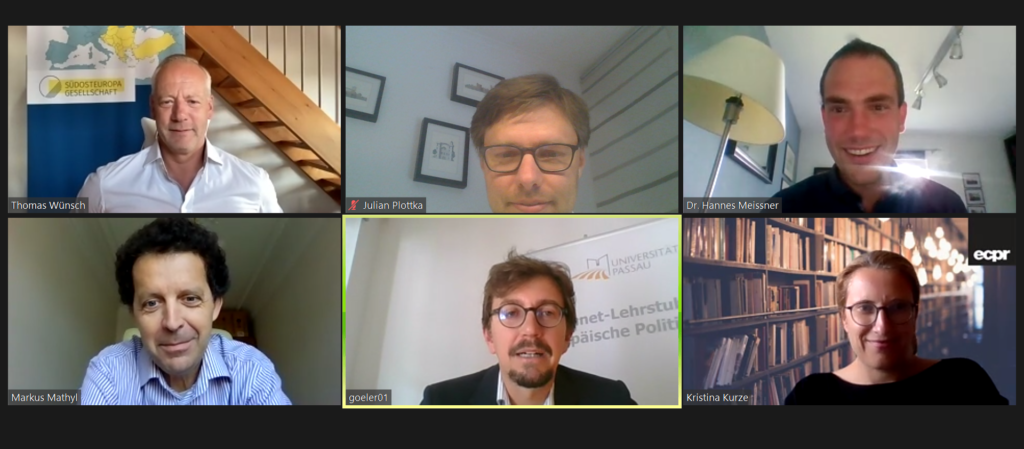In the framework of the General Conference 2021 of the European Consortium on Political Research, the Jean Monnet Network “The EU and the EEU: Between Conflict and Competition, Convergence and Cooperation” (EUCON) funded by the European Union under the programme “Erasmus+” organised the panel “The EU and the Eurasian Economic Union: A Double Contested Relationship?”. On 30 August 2021, researchers from the EUCON Network met online with external experts and conference participants to discuss the latest findings of their ongoing research projects. Based on the comments and discussions, EUCON members will revise their conference papers and prepare them for publication.
The panel focussed on the relations between the Eurasian Economic Union (EEU) and the European Union (EU), which are highly contested. Externally, relations between EEU member states and the EU are characterised by competition over geographic, economic and historical zones of influence, as well as over fundamental questions of international law, norms and values. Internally, EU member states disagree over the EU’s approach towards the EEU and its dominant member Russia. Within in the EEU, member states also take different approaches in their relations with the EU and their member states. Both internal and external contestation limit the EU’s and its members’ capability to pursue foreign policy in the Eastern Neighbourhood, Central Asia and vis à vis Russia.
Since the social constructivist turn in IR, the relevance of norms, ideas and identities in foreign policy have been highlighted in many studies. Especially EU foreign and security policy has been analysed in view of role concepts (Kirste/Maull), civilian power (Orbie) and normative power (Manners). In these research approaches the self-perceptions of the EU as well as third parties’ perception of the EU and the EU’s perception of other international actors, which are all rooted in cultural foundations and historical legacies, play an important role. From this theoretical perspective, the panel aims at understanding the causes and effects of contestation between two projects of regional integration on the internal as well as on the international level. The main research question is, how far differing self-perceptions as an international actor or different perceptions of the partner/opponent cause contestation over external relations (on the internal level) or in external relations between the EU and the EEU (on the international level).
Concerning the internal level, the EU has considered itself to be a “civilian” or “normative power” for long. In recent years, a number of political actors have called for a more “realist” or interest-driven EU foreign policy. Do these differing concepts of what kind of foreign policy actor the EU is cause internal contestation over how to approach the EEU? While the EU has developed an own foreign policy profile over the previous decades, the EEU is more focused on economic integration. However, external relations in the 21st century are not limited to traditional foreign and security policy anymore. Most policy areas, including trade and economic cooperation, have an external dimension. Therefore, the research questions regarding the EEU are: Is there a coherent self-perception of the EEU as an international actor or is its role contested? What are the consequences of contestation over the EEU’s international role? On the international level, contestation can result from differences between the external and the self-perception of an international actor. Therefore, the panel seeks to map the mutual perception of political actors in the EU and the EEU. How is the international role of the EEU and the EU perceived respectively? Do the external and the self-perception fit? Does a misfit between the external and self-perception between actors in the EU and the EEU drive contestation between both projects of regional integration?
The “The EU and the EEU: Between Conflict and
Competition, Convergence and Cooperation” (EUCON) project is a Jean Monnet
Network project co-funded by the Erasmus+ programme.

